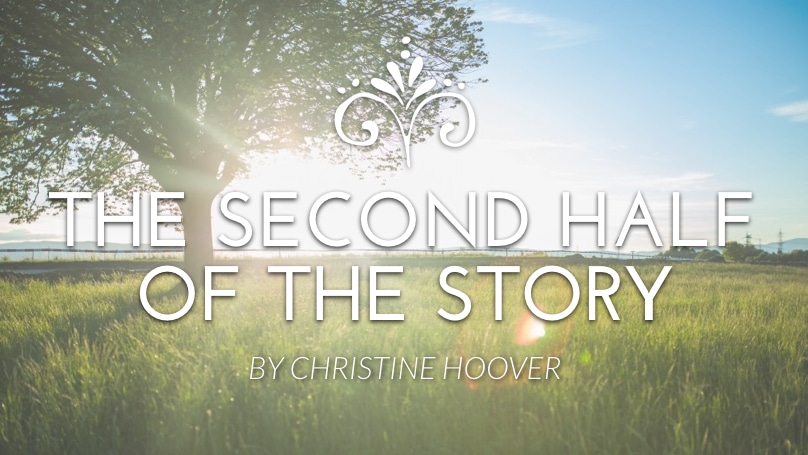The stack of books on my nightstand inches higher everyday. Some were recommended and loaned by friends, some borrowed from the library, and some sit caked in dust because I’ve put off reading them for so long. The majority of the stack, however, have scraps of paper jutting out from their pages–evidence that I’ve started reading them but never quite finished. They remain on my nightstand because I have this thing about finishing books: I want to give each book a fair shake, and reading just the first few chapters isn’t a fair shake in my opinion. The first few chapters don’t tell the whole story.
I suppose I have this thing about whole stories, because although I became a Christian when I was eight, for the 20 years that followed I only knew the first half of the gospel story. I knew that I was a sinner, and I knew that Jesus Christ died on the cross to forgive me of that sin when I confessed Him as my Savior, but I didn’t know how this act of death and resurrection affected my life after my initial salvation. I hated that I continued to sin, that I failed God, that I couldn’t be good enough to prove my worth for what He’d done for me. I knew He loved me at the cross, but I felt certain He couldn’t love me in my ever-present state of failure and weakness. So I repeatedly cycled around to the first half of the story–the part that told me I was a sinner–and then, wallowing in that truth, tried desperately to make up for my imperfections with good behavior.
I thought that was the whole story: saved by grace, sanctified by self-effort. But one day God began showing me through His Word that there is a second half to the gospel story–the part about life after salvation–and what He showed me changed everything.
Here’s what He showed me: “As you have therefore received Christ Jesus our Lord, so walk in Him” (Colossians 2:6). How had I received Christ? By faith in what He had done for me. Then why was I attempting to “walk in Him” with self-driven behaviors and good works and without any trace of faith or dependence on Him at all? Colossians 2:6 took me past the first half of the story and into the fullness of the story: We’re saved by grace through faith and also sanctified by grace through faith. Any other way is the not the gospel, because any other way is not Spirit-effort but self-effort.
The second half of the story is that God has known all along that we’d fail Him, and that we’d continue to fail Him after His sacrifice for us. It’s not that He hasn’t called us to holiness or that our sin doesn’t grieve Him, it’s just that He made a way to deal with it on our behalf, precisely so we could get on with the business of enjoying Him and He us. This is in fact the giddy delight of God toward us that is hard to see and believe when we dwell only in the first half of the story. When we begin to live in the second half of the story, however, we see it: God loves us wildly, He satisfies, and He offers us such beautiful freedom from sin, death, and our own inabilities to please Him.
When I began living in the full story, something interesting happened. I saw a growing desire for obedience in my heart. The gospel had settled into me in such a profound way that I wanted to love God back, and the way I loved God back was through surrender and good works and faithful acts of service. But this felt different than when I lived solely in the first half of the story, when I tried to respond to God before receiving from Him. This time my motivations were not dutiful or rote or an attempt to earn something from God; this time my motivation was to respond and worship. This time the Holy Spirit was actively helping me walk by the Spirit so that I wouldn’t fulfill the lusts of my flesh. I finally got 1 John 4:19: “We love because He first loved us.”
We have to get through the whole story to understand all these things about God and about the Christian life, and when we do, suddenly the joy and peace Jesus promised, those intangibles that elude us in the discomfort of the first half of the story, come into focus.
We also see this from the second-half standpoint: we just aren’t meant to dwell in the first half of the story. The first half of the story is simply our coming to a realization and acknowledgment of what God already knows about us, but He doesn’t intend for us to stay there. He intends for us to then know and recognize to what extent He went for us and revel in it. We must know the first half of the story and remember the first half of the story, because it keeps us securely dependent on and grateful for the salvation that Christ won for us on the cross. But we don’t live in the first half of the story; we live in the second and in anticipation of the story’s ending. The first half simply points us to the second half: God has won us, He delights in us, we have access to Him for everything we need for life and godliness, we have the Holy Spirit, and that the just live by faith rather than works.
It’s important to note that the first half of the story is largely about us and our sin, while the second half is about God and His actions on our behalf. Our thoughts and our focus, then, are a good litmus test to what part of the story we’re living in.
I talked about this with a friend recently who was beating herself up over her sin. She knew that she needed God’s grace, but she continually used words like “working to understand it” and “trying harder to remember to turn to God for it”. She spoke about all that she needed to do to change and understand, but very little about what God does for her. She was entrenched in the first half of the story. I repeated back to her the words I was hearing and said, “Instead of climbing to get to God, you simply need to fall back into the ocean of His grace and love. Fall back and rest in what He’s done and is doing for you. Confess your sin, and rather than dwelling in it, receive His forgiveness. Receive His enjoyment of you, for you are His beloved child. His kindness will lead you to repentance and obedience.”
That, my friends, is the whole story, the whole gospel. Let us never stop reading it, thinking about it, believing it, and living in it.
Christine has a burden for believers to know the gospel’s reach into both salvation and sanctification and, by living according to the true gospel, to experience the abundant life that Jesus promised. Her book, From Good to Grace: Letting Go of the Goodness Gospel, asks readers to consider these very things and to learn to receive the Christian life and then respond with their lives.
Purchase your copy today on Amazon, Barnes & Noble, Christianbook.com, or iTunes and discover the gospel’s reach in your own life.
Published November 30, 2015



